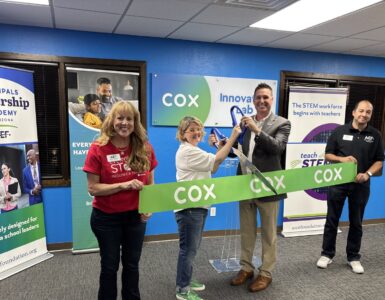There are well over 5,000 colleges and universities in the United States — so how does one choose the right fit?
Plexuss, an online platform dubbed The Global Student Network, is making the decision-making process easier for prospective college students.
The company has been around since 2011 but launched the platform in 2015. The Plexuss network won startup investment funding from the Seattle Accelerator run by Microsoft Ventures in 2018, the first company in the higher-education space to do so.
“It’s connecting students and colleges to each other,” said Dave Moniz, vice president of strategic partnerships at Plexuss. “The website is open, it’s public, and it’s free for anyone to use. You can research colleges in kind of a self-serve way, but we layered in live college admissions advising so that as students and parents have questions — whatever time of day, or weekend, when it occurs to them — we help give them immediate answers.”
That is especially helpful for first-generation college students and students from low-income or underserved areas, Moniz said. Many students in Arizona do not have as much access to counselors as they need, he said.
“Even when there is a wonderful crackerjack counseling department, there usually aren’t enough of them to go around and work as directly with as many students as they would like,” Moniz said.
“What we do for the six million students who found us on their own because they were researching majors or colleges — we’re there to answer their questions,” he said. “We’re there to guide them through all of the resources that we have.”
The mission of Plexuss is to help students make better-informed decisions about higher education by following a pipeline from K-12 schools to higher education to the workforce. That means helping them choose majors, navigate financial aid and figure out what higher-education system or program is the best fit.
“There are some great programs run by [community-based organizations] and placed in schools, but there’s selection criteria, and students might need to meet a minimum GPA, or they might need to fit a certain profile in order to be eligible for services,” Moniz said. “We take everybody — rich, poor, home school, any background. We’re available to everyone… We’ve built something that kids like.”
Moniz said Plexuss is not like walking into a library that has all the possible information one could need. Instead, the platform gives students a “guided tour” that allows them to ask questions, talk with a counselor about tough issues and compare institutions — all for no cost.
“There’s a lot of information available from the federal government, so we build college and university profiles that are consistent, that are standardized,” he said. “Students can always find the information they want about admissions or financial aid in the same place when they’re comparing colleges on our platform.”
Plexuss is also available in a mobile app, another reason Moniz attributed for the platform’s success. In addition, the website does not sell student data to colleges or other education partners unless the student chooses to be recruited by that institution.
“I don’t know that there’s anyone else operating on the same scale that we do, with millions of students, who holds themselves to that standard and gives the student that much control over their records and profile,” Moniz said.
He said he spent most of the summer in Arizona speaking directly with high schools, asking them how Plexuss can improve to better serve students and schools and reduce strain on counseling staff.
“When we partner with a school or district, we don’t ask them for any money, we don’t ask them for any data, but we ask them to tell us what we can do to be a better partner, to understand local opportunities, to be more effective when we’re advising students,” Moniz said.
That way, Plexuss does not pose a threat to existing counseling methods but serves as a supplemental resource for students, he said. Plexuss works with state legislators, counseling associations, business associations and a number of other organizations to get the “lay of the land” and support schools without duplicating work already being done.
Plexuss wants to know: Where are the gaps?
“It might be, in one school, we’re focused mostly on FAFSA completion,” Moniz said, referring to the federal student aid program. “At another, it’s on helping underclassmen in high school figure out what they want to do for a major.”
In Arizona specifically, he said he thinks every student could master the skills local employers are looking for, but it takes counseling to connect students with those choices.
“It’s not so much that [Arizona] schools aren’t teaching what students need, it’s that… a lot of [students] are tuning out or taking an alternate pathway, because they’re not connecting the dots, and they’re not seeing some of these employment opportunities as realistic for them or relevant to them,” Moniz said.
Across the nation and beyond, students who are perfectly capable of filling certain roles have additional barriers to education, he said. They need constant encouragement, or “nudges” — which Moniz said is becoming a more “scientific” term — to pursue an education and career pathway.
Plexuss exists to help students articulate their goals and understand how to achieve them, Moniz said.
“We already have students from almost every high school in Arizona on our platform,” he said. “We’d like to be at 100 percent, and we’d like the schools to feel comfortable telling us what we could do to be a better partner and improve the quality of our work so their kids have better outcomes.”
















Add comment